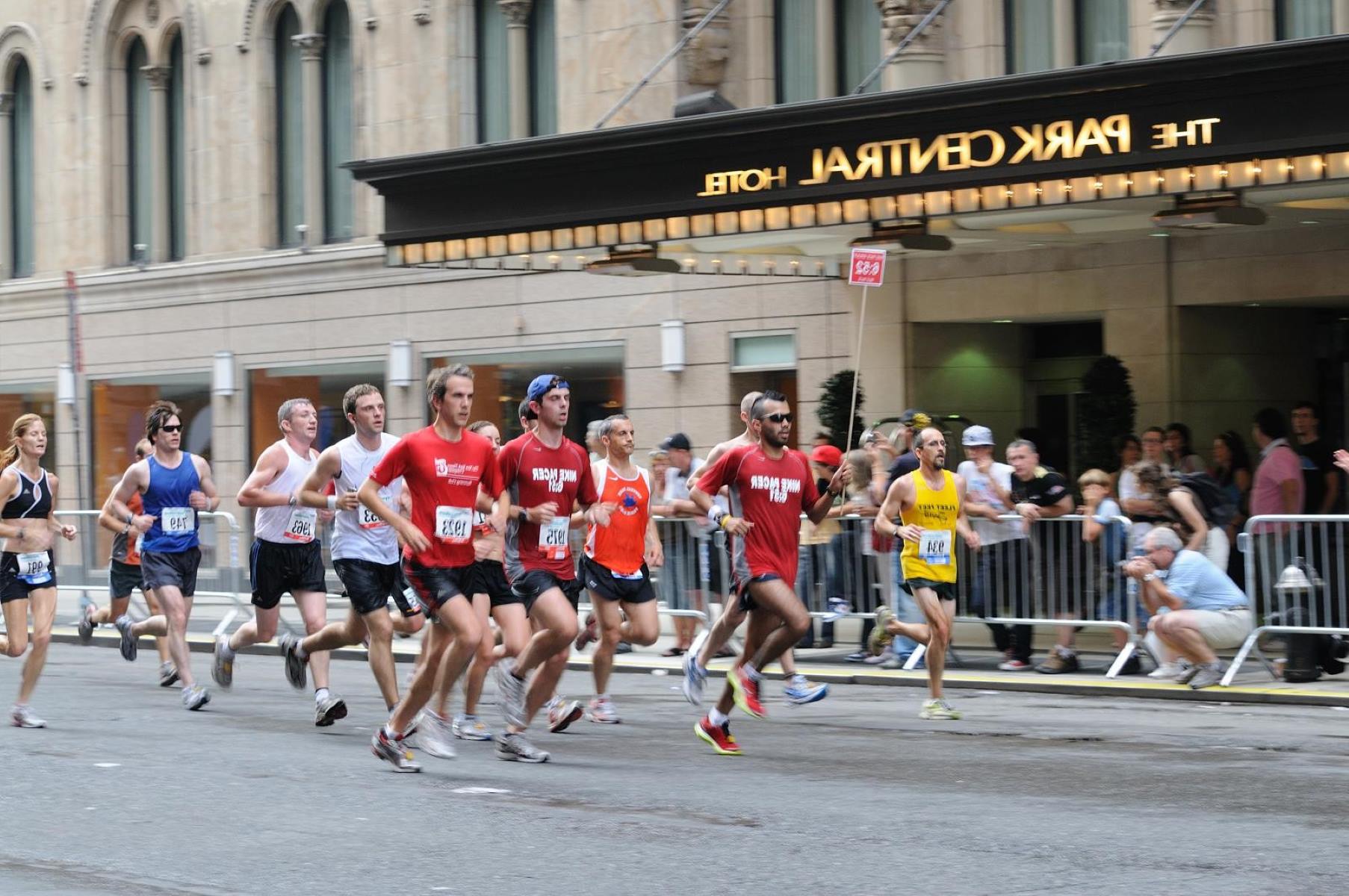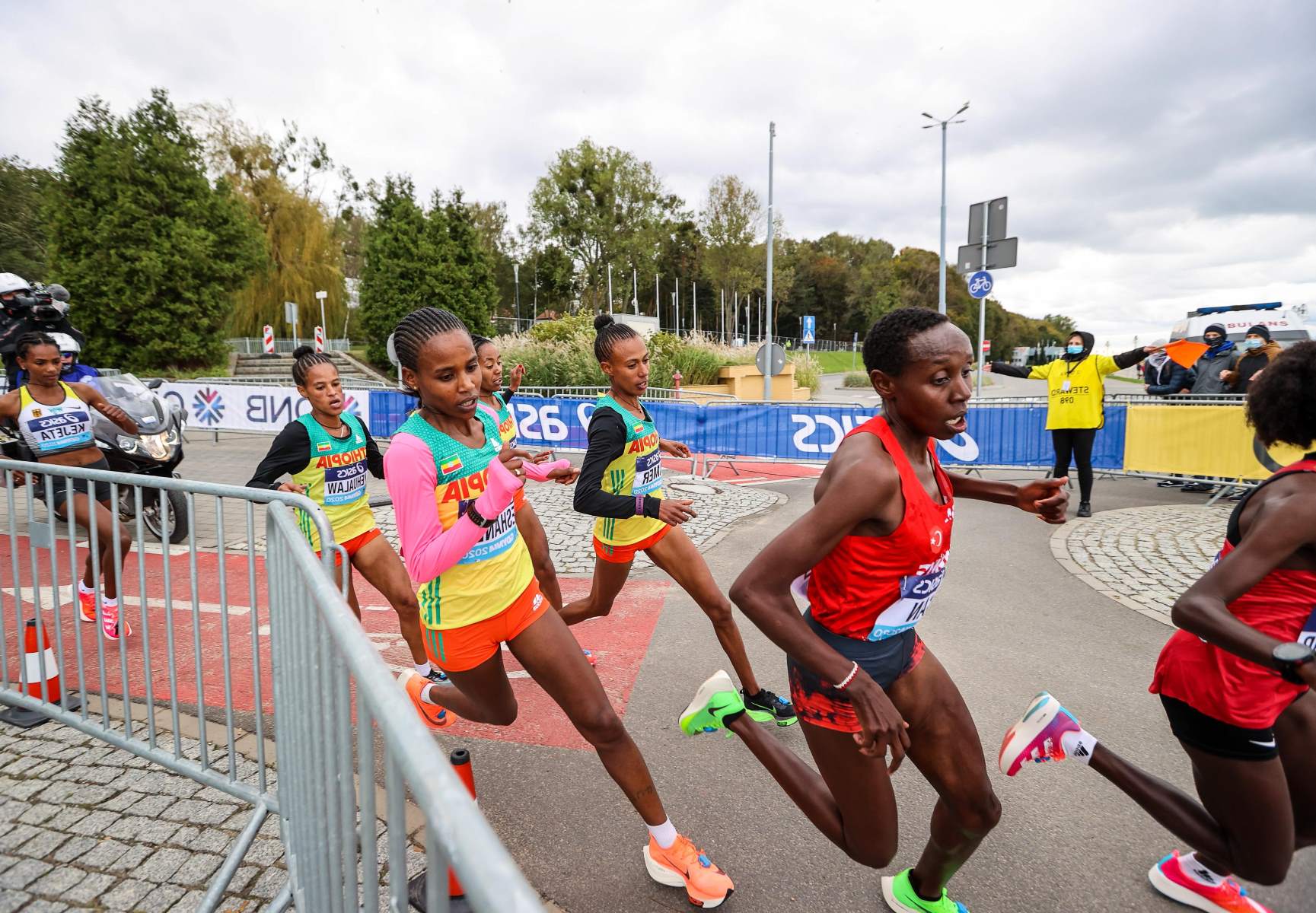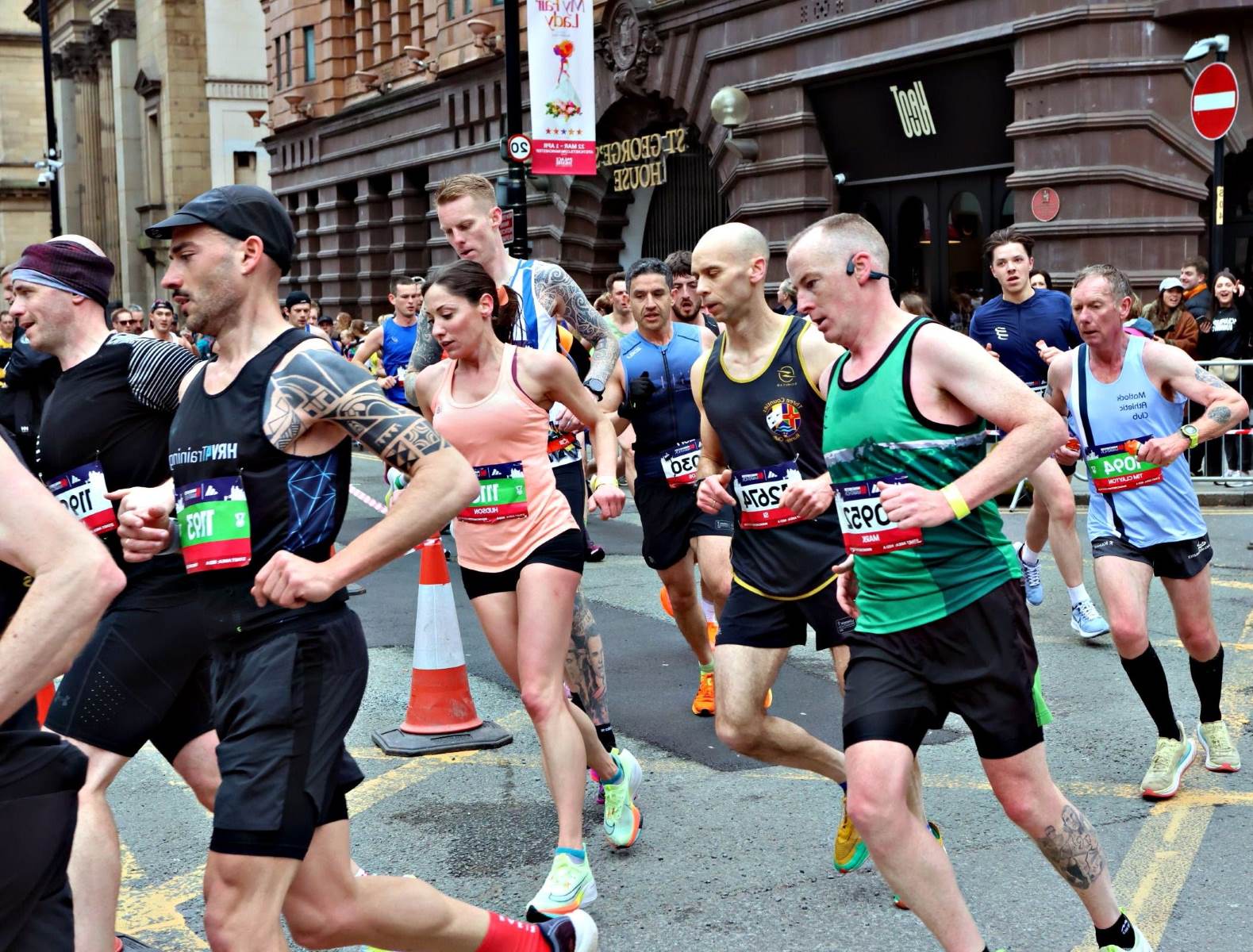Home>Training & Techniques>Achieving A Sub-2 Hour Half Marathon: A Guide To Success


Training & Techniques
Achieving A Sub-2 Hour Half Marathon: A Guide To Success
Published: March 4, 2024
Achieve your goal of running a sub-2 hour half marathon with effective training techniques. This comprehensive guide will help you succeed in your training journey.
(Many of the links in this article redirect to a specific reviewed product. Your purchase of these products through affiliate links helps to generate commission for Therunningadvisor.com, at no extra cost. Learn more)
Table of Contents
Setting Realistic Goals
Setting realistic goals is the cornerstone of a successful half marathon journey. It's essential to establish clear and achievable objectives that align with your current fitness level, lifestyle, and overall aspirations. Here's how you can set realistic goals for your sub-2 hour half marathon endeavor:
-
Assess Your Current Fitness Level: Begin by honestly evaluating your current running abilities. Consider factors such as your recent race times, training consistency, and overall endurance. Understanding where you stand will help you set a realistic target for your upcoming half marathon.
-
Understand the Course: Research the course terrain, elevation, and weather conditions for the race. This information will influence your goal-setting process, as a hilly course may require a different approach compared to a flat one.
-
Consult with a Coach or Experienced Runners: Seeking advice from seasoned runners or a professional coach can provide valuable insights into goal setting. They can offer guidance on pacing, training intensity, and realistic time targets based on your current capabilities.
-
Consider Incremental Improvements: If your current half marathon time is significantly above the 2-hour mark, consider setting incremental improvement goals. For example, aiming to shave off a few minutes from your previous race time can be a realistic and motivating target.
-
Factor in Training Time: Be mindful of the time available for training leading up to the race. Setting a goal that aligns with your training capacity and other commitments will contribute to a more realistic and sustainable approach.
-
Account for External Factors: Acknowledge external factors that may impact your performance, such as work commitments, family responsibilities, and potential injuries. Setting realistic goals involves considering these variables and adjusting your expectations accordingly.
By setting realistic goals, you lay a solid foundation for your sub-2 hour half marathon pursuit. This approach fosters a sense of purpose, motivation, and a clear roadmap for your training and race day strategy. Remember, the journey towards achieving your goal is as important as the goal itself, so embrace the process with determination and a positive mindset.
Training Plan Overview
Embarking on a sub-2 hour half marathon journey requires a well-structured and progressive training plan. The training plan serves as the roadmap to prepare your body for the physical demands of the race while honing your mental resilience. Here's a comprehensive overview of the key components that constitute an effective training plan for achieving your sub-2 hour half marathon goal:
1. Mileage Build-Up
The foundation of any successful half marathon training plan is the gradual increase in mileage. This progressive approach allows your body to adapt to the increasing distance and intensity, reducing the risk of overuse injuries. The training plan typically spans several weeks, with a focus on building endurance through long runs, tempo runs, and easy recovery runs.
2. Speed Work
Incorporating speed work into your training plan is essential for improving your running efficiency and overall pace. Interval training, tempo runs, and hill repeats are common components of speed work that help enhance your cardiovascular capacity and muscular strength. These structured workouts are strategically integrated into the training plan to stimulate physiological adaptations that contribute to faster race times.
3. Rest and Recovery
A well-designed training plan prioritizes adequate rest and recovery periods to prevent burnout and minimize the risk of injuries. Rest days and easy recovery runs are strategically scheduled to allow your body to adapt to the training load and optimize the benefits of your hard work. Additionally, cross-training activities such as cycling, swimming, or yoga can complement your running regimen while providing active recovery.
4. Long Runs
Long runs are the cornerstone of half marathon training, simulating the race distance and preparing your body for the physical and mental challenges ahead. These sustained efforts gradually increase in distance, allowing you to build endurance, practice race-day nutrition and hydration strategies, and familiarize yourself with pacing for the target finish time.
5. Tapering Phase
As the race day approaches, a well-structured training plan incorporates a tapering phase to allow for physical and mental rejuvenation. The tapering period involves a reduction in training volume while maintaining intensity, enabling your body to recover fully and peak on race day.
6. Flexibility and Adaptability
A successful training plan embraces flexibility and adaptability to accommodate unforeseen circumstances, such as illness, fatigue, or unexpected life events. Adjustments to the training schedule may be necessary at times, and a well-structured plan allows for modifications without compromising the overall progress.
By integrating these key elements, a comprehensive training plan sets the stage for your sub-2 hour half marathon pursuit. It not only prepares your body for the physical demands of the race but also cultivates mental fortitude and race-day readiness. As you embark on this transformative journey, trust in the process, stay consistent, and embrace the incremental progress that will ultimately lead you to the finish line within your desired time goal.
Nutrition and Hydration
Nutrition and hydration play a pivotal role in optimizing performance and sustaining energy levels throughout the rigorous demands of a half marathon, especially when aiming for a sub-2 hour finish. Proper fueling and hydration strategies can significantly impact your race day experience and overall outcome. Here's a detailed exploration of the essential aspects of nutrition and hydration for your sub-2 hour half marathon journey:
Pre-Race Nutrition
In the days leading up to the race, focus on consuming a well-balanced diet rich in complex carbohydrates, lean proteins, healthy fats, and an array of vitamins and minerals. Carbohydrates serve as the primary fuel source for endurance activities, making them a crucial component of your pre-race nutrition. Incorporate whole grains, fruits, vegetables, and legumes into your meals to ensure adequate glycogen stores in your muscles. Additionally, stay mindful of portion sizes and avoid experimenting with new or unfamiliar foods that may cause gastrointestinal discomfort.
Hydration Strategies
Proper hydration is fundamental for maintaining optimal performance and preventing dehydration during the race. In the days preceding the event, prioritize consistent hydration by consuming adequate water and electrolytes. On race day, aim to start the event well-hydrated and maintain a steady intake of fluids throughout the race. Consider the race conditions and temperature when planning your hydration strategy, adjusting your fluid intake accordingly. Electrolyte-enhanced sports drinks can help replenish essential minerals lost through sweat and sustain electrolyte balance during prolonged exertion.
Race Day Nutrition
During the race, fueling strategies become paramount in sustaining energy levels and staving off fatigue. Depending on your individual preferences and tolerance, consider consuming easily digestible carbohydrates in the form of energy gels, chews, or sports drinks at regular intervals. Practice your race day nutrition plan during training to gauge its effectiveness and minimize the risk of gastrointestinal distress. Additionally, be mindful of the aid stations along the course and plan your fueling strategy accordingly to ensure a consistent intake of carbohydrates and fluids.
Post-Race Recovery
Following the completion of the half marathon, prioritize post-race recovery by replenishing glycogen stores and facilitating muscle repair and recovery. Consuming a balanced post-race meal containing carbohydrates, proteins, and healthy fats within the first hour after finishing the race can expedite the recovery process. Additionally, hydrate adequately to restore fluid balance and aid in the elimination of metabolic byproducts accumulated during the race.
By meticulously addressing the nuances of nutrition and hydration, you can optimize your physical performance and mental resilience, ultimately enhancing your prospects of achieving a sub-2 hour half marathon finish. Embrace a holistic approach to fueling and hydration, and tailor your strategies to align with your individual needs and preferences, thus empowering yourself for a successful and fulfilling race day experience.
Mental Preparation
Mental preparation is a critical component of achieving success in a sub-2 hour half marathon. The ability to cultivate a resilient and focused mindset can significantly impact your performance, especially during the latter stages of the race when physical fatigue and mental exhaustion may set in. Here's an in-depth exploration of the key strategies for mental preparation that can empower you to conquer the challenges of the half marathon journey:
Visualization and Positive Affirmations
Engaging in visualization exercises can bolster your mental fortitude and enhance race day preparedness. Take time to visualize yourself crossing the finish line with a strong and confident stride, envisioning the exhilaration and sense of accomplishment that accompanies achieving your sub-2 hour goal. Additionally, incorporating positive affirmations into your mental preparation routine can instill a sense of self-belief and resilience. Repeat empowering phrases such as "I am strong," "I am capable," and "I can overcome any challenge" to reinforce a positive and determined mindset.
Goal Setting and Mantra Development
Establishing clear and attainable race day goals can provide a focal point for your mental preparation. Define specific objectives, such as maintaining a consistent pace, conquering challenging segments of the course, or executing a strategic finishing kick. Develop a personal mantra that resonates with your aspirations and embodies your determination. Whether it's a single word, a phrase, or a motivational quote, your mantra can serve as a source of inspiration and resolve during pivotal moments of the race.
Stress Management and Mindfulness
Practicing stress management techniques and mindfulness exercises can equip you with the tools to navigate the inevitable ebbs and flows of the race. Incorporate deep breathing exercises, progressive muscle relaxation, or mindfulness meditation into your training regimen to cultivate a calm and focused mindset. By honing your ability to stay present and composed, you can effectively manage race day jitters and maintain mental clarity throughout the half marathon.
Resilience Building and Mental Toughness
Embracing the challenges of training and acknowledging moments of discomfort can fortify your mental resilience. Recognize that the journey to a sub-2 hour half marathon is a test of both physical and mental endurance. Embrace the discomfort of long runs, grueling speed workouts, and moments of self-doubt as opportunities to strengthen your mental toughness. By confronting and overcoming adversity during training, you can bolster your confidence and resilience for race day.
Adaptive Mindset and Race Day Flexibility
Maintaining an adaptive mindset and embracing race day flexibility are essential for navigating unforeseen circumstances. Acknowledge that the race may present unexpected challenges, such as inclement weather, pacing adjustments, or physical discomfort. Prepare yourself mentally to adapt to these variables, focusing on solutions rather than dwelling on setbacks. Embracing a flexible mindset empowers you to make real-time adjustments and stay resilient in the face of adversity.
By integrating these mental preparation strategies into your training and race day approach, you can cultivate a resilient and focused mindset that aligns with your pursuit of a sub-2 hour half marathon finish. Embrace the transformative power of mental preparation, and harness the strength of your mind to propel you towards your goal with unwavering determination and unwavering resolve.
Race Day Strategy
Race day represents the culmination of months of dedicated training and preparation, and your race day strategy plays a pivotal role in realizing your goal of achieving a sub-2 hour half marathon. As you stand on the brink of this transformative journey, it's essential to approach race day with a well-defined and adaptable strategy that encompasses various facets of the racing experience.
Pacing and Execution
The cornerstone of your race day strategy revolves around pacing and execution. Establish a clear pacing plan that aligns with your sub-2 hour goal, factoring in the course terrain, elevation changes, and potential weather conditions. Begin the race with a controlled and sustainable pace, resisting the temptation to start too fast amidst the excitement of the event. Adhering to a well-calibrated pacing strategy during the initial miles sets the stage for a strong and consistent performance throughout the race.
Fueling and Hydration
Strategically integrating fueling and hydration into your race day plan is paramount for sustaining energy levels and preventing depletion. Leverage the aid stations along the course to replenish fluids and consume carbohydrates at regular intervals, adhering to the fueling strategy practiced during training. Stay attuned to your body's cues and adjust your fueling and hydration approach based on the race conditions and your individual needs, ensuring a balanced intake that supports your performance.
Mental Resilience and Focus
Cultivating mental resilience and unwavering focus is instrumental in navigating the mental and emotional ebbs and flows of the race. Embrace the inevitable challenges that arise during the race with a positive and adaptive mindset. Leverage visualization techniques and positive affirmations to bolster your resolve, staying present and engaged with each stride. Embrace the support of fellow runners and draw strength from the electrifying race day atmosphere to fuel your determination.
Adaptability and Contingency Planning
Race day often presents unforeseen variables that necessitate adaptability and contingency planning. Embrace the need for flexibility, acknowledging that adjustments to your race day strategy may be required based on evolving circumstances. Whether it's a sudden change in weather, unexpected fatigue, or pacing recalibration, approach these moments with a solution-oriented mindset. Embrace the opportunity to adapt and recalibrate your approach while staying committed to your overarching goal.
Finish Line Surge
As the finish line draws near, summon your reserves and unleash a calculated surge to propel yourself towards the sub-2 hour milestone. Dig deep into your mental and physical reserves, drawing upon the cumulative strength and determination cultivated throughout your training journey. Embrace the crescendo of the race, channeling your unwavering resolve into a final surge that propels you across the finish line with triumphant strides.
By meticulously crafting and executing a comprehensive race day strategy that encompasses pacing, fueling, mental resilience, adaptability, and a decisive finish line surge, you position yourself for a triumphant sub-2 hour half marathon finish. Embrace the totality of the race day experience, drawing upon the culmination of your training and preparation to propel yourself towards the realization of your goal with unwavering determination and resolve.
Recovery and Post-Race Care
Recovery and post-race care are integral components of the half marathon journey, playing a pivotal role in facilitating physical rejuvenation, mitigating post-race soreness, and expediting overall recovery. As you cross the finish line and bask in the euphoria of accomplishing your sub-2 hour half marathon goal, it's essential to prioritize comprehensive recovery strategies to optimize the restoration of your body and mind.
Immediate Recovery
In the immediate aftermath of completing the half marathon, focus on gradual cooldown activities to aid in the dissipation of accumulated metabolic byproducts and facilitate muscle recovery. Engage in light walking or gentle jogging to promote circulation and prevent the onset of muscle stiffness. Additionally, prioritize hydration by replenishing fluids lost during the race, ensuring a balanced intake of water and electrolytes to restore fluid balance and support the elimination of metabolic waste products.
Nutritional Replenishment
Post-race nutrition plays a pivotal role in replenishing depleted glycogen stores, facilitating muscle repair, and jumpstarting the recovery process. Consume a well-rounded post-race meal containing a balance of carbohydrates, proteins, and healthy fats within the first hour after finishing the race. Incorporate nutrient-dense foods such as lean proteins, whole grains, fruits, and vegetables to provide essential macronutrients and micronutrients that support the recovery and repair of muscle tissue.
Active Recovery
Engage in active recovery practices to promote circulation, alleviate muscle soreness, and expedite the restoration of mobility and flexibility. Gentle stretching exercises targeting major muscle groups can alleviate post-race tightness and enhance range of motion. Additionally, consider incorporating low-impact activities such as swimming, cycling, or yoga in the days following the race to facilitate active recovery while minimizing stress on fatigued muscles and joints.
Rest and Regeneration
Prioritize adequate rest and sleep in the days following the half marathon, allowing your body to undergo comprehensive regeneration and repair. Embrace the opportunity for physical and mental rejuvenation, acknowledging the significance of rest in the overall recovery process. Quality sleep serves as a catalyst for muscle repair, immune function, and the consolidation of training adaptations, thus playing a pivotal role in post-race recovery.
Reflect and Rejuvenate
Take time to reflect on your sub-2 hour half marathon achievement and celebrate the culmination of your dedicated training and perseverance. Embrace a sense of accomplishment and pride in your performance, acknowledging the mental and physical fortitude that propelled you across the finish line. Engage in activities that rejuvenate your spirit and foster a sense of holistic well-being, whether it's spending time with loved ones, engaging in leisurely pursuits, or simply basking in the sense of fulfillment that accompanies achieving your goal.
By embracing a comprehensive approach to recovery and post-race care, you empower your body and mind to rebound from the rigors of the half marathon, setting the stage for continued progress and future endeavors. Embrace the restorative power of recovery, and honor the resilience and determination that propelled you towards your sub-2 hour half marathon triumph.









